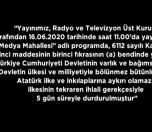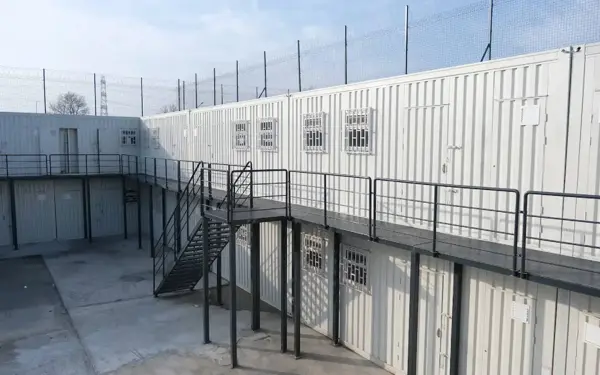Click to read the article in Turkish
Fined over criticisms about Ottoman Sultan Abdülhamid II by the Radio and Television Supreme Council (RTÜK), broadcaster TELE 1 has been blacked out for five days starting from this midnight (September 3). While the channel was blacked out when a live program was still on air, if TELE 1 receives another fine from the RTÜK, its license will be completely cancelled.
CLICK - TELE1 TV imposed blackout over remarks on Ottoman sultan in unprecedented decision
Journalism organizations agree that this is a blow to freedom of expression in the country and protest that the government targets critical channels.
We have spoken with Reporters Without Borders (RSF) Representative to Turkey Erol Önderoğlu, Confederation of Progressive Trade Unions of Turkey (DİSK) Press Union Chair Faruk Eren and Journalists' Union of Turkey (TGS) General Secretary for Organization Mustafa Kuleli:
Önderoğlu: RTÜK lives on a single ideology
"What we are still surprised about is this: While it has long been criticized over its discriminating behavior in controlling the media in Turkey, the RTÜK, without being disturbed by these criticisms, focuses on eliminating the criticisms against itself also by censorship.
"While RTÜK approves a single-type journalism living on a single ideology, it acts like it occupies itself with 'self-control.'
"In fact, it was itself one of the defenders of a completely antidemocratic interventionism while carrying out the political project oriented to undermine certain critical media outlets in those years.
"In our eyes, RTÜK is a political structure that has cut its ties with the institutionalization of a democratic society. It seems like there is no solution left other than advising our colleagues to be careful."
Eren: Government wants an obedient media
"Press freedom itself is very important for democracy. If there is no press freedom, there is no democracy. And, now, freedom of press is fighting for its life in Turkey. Every news story is accused with an official notice. You are either summoned to court or you are detained, arrested or confined.
"The case of TELE 1 might be a grave decision in itself; but it is not the first time that something like that happens in Turkey. Unfortunately, when the State of Emergency was in effect, TV channels and newspapers were completely closed in Turkey. The government has taken over an overwhelming majority of the media. TV channels, newspapers, websites...
"But, apparently, the government has not yet found what it was hoping for. The reliability of the channels or newspapers that obey the government just disappears. They are watched and read less and less.
"In return, the channels and newspapers like TELE 1, which try to do critical journalism, have become much more effective.
"Though the government wants a silent and obedient media, it now faces the resistance of real journalists. There are real journalists who want to report the truth and try to prevent people from believing government's lies.
"The government must be bothered with this very fact because it has started accusing TELE 1 and Halk TV broadcasters with various excuses and giving blackout decisions over blackout decisions.
"Fines are not limited to TV channels. There is also an attempt to bring newspapers under pressure and to completely silence them via the Press Advertising Institution (BİK). But they will not manage to do this. As in the case of TELE 1, it has caused serious public backlash. When the channel is reopened, it will reach the same number of viewers."
Kuleli: We are now tired of commenting
"In a country where the law is suspended, there is no sense in commenting on this unlawfulness, saying, 'It is against the law, it is not lawful or ethical.' We are now tired of commenting on these unlawful incidents. Even though we have long been trying to make our comments within the boundaries of law, circumstances force us to enter the field of politics.
"It is clear as day that the AKP government is disturbed by the tiniest different opinion or criticism, it sees them as a threat to its existence. As its existence is hanging by a thread, it cannot tolerate the slightest criticism. It tries to prevent the richness of ideas from spreading in society and reciprocated by people. It is afraid that different opinions will prevail in society.
"And the decision about TELE 1 is the last example of that. TELE 1 television is one of the media outlets that cannot be controlled by Erdoğan. The government controls over 90 percent of Turkey's media.
"The few remaining media outlets and critical channels appall them. Because they are aware that their own channels have no impact on society, they are aware that dissident voices are held in esteem by society.
"They know that different opinions, uneasiness and criticisms are gradually increasing in society. For this reason, with pressure, force and legal regulations, they are trying to straitjacket people.
"Democracy does not solely mean free elections or a constitution. Democracy is a culture that accepts different opinions together. It is quite a rare culture in Turkey. For Mr. President, differences mean discord. They mean dividing the country. He has somehow cannot grow to this democratic maturity. Therefore, in his eyes, different opinions are on the top of the list of those that need to be silenced.
"So, it does not make any difference if that is daily BirGün, Karar, Yeniçağ, Cumhuriyet or TELE 1. We are faced with a mentality that sees everyone who is not like-minded as enemies. In fact, if a government had the slightest confidence in itself, it would learn from criticisms. It would know that criticisms make it stronger." (HA/SD)








-132.jpg)




